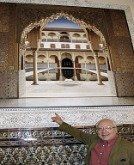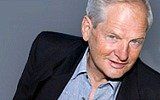In comments for finews.com, billionaire art collector Urs E. Schwarzenbach details how be began collecting art with his first salary from UBS, and slams accusations from Zurich tax officials. Questions were posed by his lawyer, Ulrich Kohli.
Mr. Schwarzenbach, when did you buy your first piece of art?
That was before I turned 20. I won a drawing contest at grammar school and I wanted to become an artist. I had a natural inclination towards painting.
Both of my parents were drawn to art. My role model was Pablo Picasso. Later, I considered architecture because I was a better at technical drawing than I was at artistic painting. Corbusier was my ideal. In the end I gave up that ambition too and became a banker.
Do you remember your first art purchase?
Of course. As soon as I began earning money at UBS, I bought art. I began collecting sculptures by J. Metzler, Silvio Mattioli and so on. Bernhard Luginbuehl and Jean Tinguely were still too expensive at that time. I was in my early twenties when I started buying from the Zurich sculptures known at the time.
«I visited Studio 54 and met Andy Warhol»
At that time, paintings by H.R. Giger and Cuno Amiet cost between 5,000 and 10000 Swiss francs ($4,970 to $9,949). Sculptures sold for less and were more affordable for me.
What happened next? You obviously collect more than sculptures.
Yes. Later on, when I began earning more, I started buying pictures.
What kind?
I visited Studio 54 in the 70s, met Andy Warhol as well as Jean Michel Basquiat in 1988, shortly before he died. In the 80s, the «jungen Wilden» (a generation of artists known as the young wild ones) came together in Germany. I always had very good relationships to the artists themselves.
How would you describe the art that you bought when you began collecting?
At first it was about buying sculptures, but then I began meeting upcoming living artists in the avant-garde like Julian Schnabel, Basquiat, Warhol, all of whom I knew.
How much were you spending?
$20,000 to $50,000 – but $50,000 was a lot of money at that time. I bought a Basquiat for $490,000 in 1990. The piece is worth $40 million today.
That's an enormous appreciation in value. Did you ever think about investing speculatively in art?
No, never. I don't speculate on art or in real estate. When I built a chapel in England for £30 million, I needed some money so I sold two pieces: a Piet Mondrian and a Henry Moore sculpture.
«Absurd. I'm a collector, certainly not a dealer»
Otherwise, I generally don't sell. I'm a collector, not a dealer.
You must have earned well in those years, and later. How did you accumulate the funds which you later invested in art?
I already earned well in the 80s through currency speculation: rising dollar and falling sterling for example. I made the really big money in the 90s, more than 2.5 billion francs. But I lost about 1 billion francs in 1998 during the Asia crisis. Easy come, easy go (laughs).
Zurich tax officials claim you are a dealer and have demanded back taxes from you.
That is absurd. I am certainly not an art dealer. I'm a collector, this is my passion. Have you ever heard of an art dealer who hangs up the pictures he deals in in his own home?
«I never invested in stocks»
My collection is not for sale. The art works are displayed in the private rooms of my various homes. They are part of the furnishings.
You mentioned passion. In short, your collecting is a personal hobby?
Yes, I'd definitely say that. I've never invested in stocks. I invested in real estate and art, but I never speculated with those investments – so I never deal or trade in them to make money. My real estate and art investments are a sort of pension for me.
How did you find art to buy? Were you advised?
No, I didn't need an advisors. I know my way around, an affinity for art is in my DNA. I don't need gallery owners either. There were roughly six noteworthy galleries in the world in the 70s. I met them through the artists and thanks to word of mouth.
You bought art just to augment your collection. Any exceptions?
As I mentioned, when I wanted to build a chapel in England for £30 million, I sold two pieces to finance it.
You have also lent from your collection. Does that happen often?
We often loan to museums. I employ a few people in Zurich who look after this.
What do you and your staff in Zurich do?
My family office is in Villa Falkenstein (a Neo-Gothic manse in central Zurich). My artworks are managed, catalogued and archived – nothing else. We could do this anywhere in the world, but until now Switzerland has been an ideal spot to do so. The tax authority obviously wants to put an end to this.
«Switzerland will lose its reputation as an art center if the authorities keep this up»
I don't need the management in Zurich, I can transfer it elsewhere. I certainly don't have a premises for dealing in art, as the tax authority has arbitrarily accused me of. That is completely absurd.
Until now, Switzerland has been an art center for the world. It will lose that reputation if customs and tax authorities keep treating people like they did me. Competitors in Luxembourg and London would be only too happy for that to happen.
Were people able to visit your offices in Zurich and view your artworks and make you an offer, or to show you artworks for sale?
No. I do get offers constantly, but I don't buy from people who go around hawking. I only buy directly from reputable artists, and the respected artists know me anyway. The only place you can visit is the Dolder Grand (a Schwarzenbach-owned luxury hotel in Zurich), which exhibits world-class art.
«Villa Falkenstein is accessible by invitation only»
My private homes and Villa Falkenstein are only accessible by invitation – «by appointment only».
So it cannot be stated that you run a gallery, which is what officials in Zurich accuse you of?
No, quite the contrary. I also never wanted to set up a museum. It's not that I want to deny myself to the art work. It's more that I built my personal collection for my own pleasure and decoration.
We're here in the Palais Layadi, in Marrakesh. You just had a large piece by contemporary British artist Ben Johnson hung in the dining room. What sort of relationship do you have to artists?
I bought my first Ben Johnson piece over 20 years ago, a panoramic view of Zurich. It's now displayed in the restaurant of the Dolder Grand.
The Johnson piece hanging in the Palais Layadi was seized at the beginning of last year in Spain, where you had landed on the way to Mexico to visit one of your hunting friends.
Yes, that was outright scandalous. I had already had a Johnson piece hung in the dining room of my palais and I wanted to hang a complimentary piece from him on the opposite wall. I commissioned the picture from him, and after two years it was finished.
«The picture was wrongfully seized. Swiss customs are to blame»
 I declared it in Samedan, Switzerland before departing, as an export to Marrakesh. Customs then unlawfully informed their Spanish colleagues that I had the piece with me on the flight. I was inspected when I landed in Spain.
I declared it in Samedan, Switzerland before departing, as an export to Marrakesh. Customs then unlawfully informed their Spanish colleagues that I had the piece with me on the flight. I was inspected when I landed in Spain.
The piece was wrongly seized. It's the fault of Switzerland's customs authorities, who thought I wanted to smuggle it to Spain. With considerable effort, I was able to get it released again and took it with me when I visited my hunting friend in Spain again this year. As you can see, it now hangs opposite the other Johnson piece on the wall (pictured at left).
Where are you physically when you buy pictures?
Wherever I happen to be. Certainly not primarily in Switzerland. Mainly in England or Australia.
Did you buy your collection in your own name?
Only exceptionally. Usually I bought them in the name of companies.
Why companies?
It's obvious: mainly for discretion. Nobody needs to know that Schwarzenbach has bought art, or which art I bought. It's like in banking: lots of talk around it. The companies are my protective shield.
Are there other reasons?
There are three reasons for using when acquiring for my collection: firstly, I can maintain privacy and discretion. Secondly, I can spread artworks like eggs in different baskets to minimize my risk. And third, using companies make my succession planning easier.
Have you bought art for third parties?
In exceptions, but that's nobody's business.
Actually,the Swiss authorities claim that if you bought for someone else and took a cut, it is art dealing. What is your response.
That is utterly false. Nonsense. I acted as a representative in a few cases, without disclosing myself as such to the seller when signing contracts. Under article 32 of the Swiss Code of Obligations, this is possible. It isn't buying and selling the works on.
You acted on behalf of someone else?
Yes. I carried out business for buyers who didn't want to be publicly outed. It wasn't many: very good friends, prominent people, who released me from my obligations towards the seller.
Did you receive any payment for your services?
Of course, as is customary. I received expenses and a fee – that's normal. Nobody works for free, and my clients relied on my knowledge and good connections to artists.
«I'm not required to keep track»
They didn't want to take care of the execution themselves. But the commission didn't go to me, incidentally – it went to the firms which procured the order.
Through the years, how often would you say you bought art on behalf of other people?
I don't have statistics and I'm not under any obligation to keep track. I can count the number of mandates on one hand. I can't disclose any names – it's about discretion.
«When George Soros speculates, it's acceptable and he's even a superhero»
People in the public eye want to remain anonymous and knew that I could ensure that. Even my staff in Zurich didn't know who I was buying for in these exceptional cases.
Your fortune is always the subject of speculation.
Yes, it has legs. Look, when a George Soros goes from 0 to £35 billion through shrewd speculation, it's acceptable. He's a superhero, even. But when a middle-class guy from outside of Zurich multiplies his inheritance to more than 1 billion, it's immediately suspicious in the culture of envy that has pervaded Switzerland.
This talk with art collector and owner of The Dolder Grand Hotel in Zurich Urs E. Schwarzenbach was conducted on February 9 in the Palais Layadi in Marrakesh.
 The questions were posed by Ulrich Kohli, a business lawyer in Zurich who represents Schwarzenbach in the criminal cases over his art.
The questions were posed by Ulrich Kohli, a business lawyer in Zurich who represents Schwarzenbach in the criminal cases over his art.
He began his career as a newspaper reporter, studied law, and worked in criminology and in the justice system before establishing his law practice. Kohli is also a writer and commentator who publishes under the pseudonym James Douglas.


































